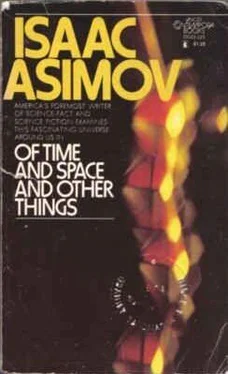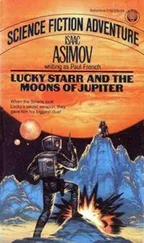Isaac Asimov - Of Time and Space and Other Things
Здесь есть возможность читать онлайн «Isaac Asimov - Of Time and Space and Other Things» весь текст электронной книги совершенно бесплатно (целиком полную версию без сокращений). В некоторых случаях можно слушать аудио, скачать через торрент в формате fb2 и присутствует краткое содержание. Год выпуска: 1972, ISBN: 1972, Издательство: Lancer Books, Жанр: Прочая научная литература, на английском языке. Описание произведения, (предисловие) а так же отзывы посетителей доступны на портале библиотеки ЛибКат.
- Название:Of Time and Space and Other Things
- Автор:
- Издательство:Lancer Books
- Жанр:
- Год:1972
- ISBN:ISBN: 0-447-33023-3
- Рейтинг книги:4 / 5. Голосов: 1
-
Избранное:Добавить в избранное
- Отзывы:
-
Ваша оценка:
- 80
- 1
- 2
- 3
- 4
- 5
Of Time and Space and Other Things: краткое содержание, описание и аннотация
Предлагаем к чтению аннотацию, описание, краткое содержание или предисловие (зависит от того, что написал сам автор книги «Of Time and Space and Other Things»). Если вы не нашли необходимую информацию о книге — напишите в комментариях, мы постараемся отыскать её.
Of Time and Space and Other Things — читать онлайн бесплатно полную книгу (весь текст) целиком
Ниже представлен текст книги, разбитый по страницам. Система сохранения места последней прочитанной страницы, позволяет с удобством читать онлайн бесплатно книгу «Of Time and Space and Other Things», без необходимости каждый раз заново искать на чём Вы остановились. Поставьте закладку, и сможете в любой момент перейти на страницу, на которой закончили чтение.
Интервал:
Закладка:
On March 13, 1781, a German-English astronomer, William Herschel, surveying the heavens, found what he thought was a comet. This, however, proved quickly to be no comet at all, but a new planet with an orbit outside that of Saturn.
There arose a serious problem as to what to name the new planet, the first to be discovered in historic times.
Herschel himself called it "Georgium Sidus" ("George's star") after his patron, George III of England, but this third attempt to honor royalty failed. Many astronomers felt it should be named for the discoverer and called it "Herschel." Mythology, however, won out.
The German astronomer Johann Bode came up with a truly classical suggestion. He felt the planets ought to make a heavenly family. The three innermost planets (exclud ing the Earth) were Mercury, Venus, and Mars, who were siblings, and children of Jupiter, whose orbit lay outside theirs. Jupiter in turn was the son of Saturn, whose orbit lay outside his. Since the new planet had an orbit outside Satum's, why not name it for Uranus, god of the sky and father of Saturn? The suggestion was accepted and Uranus* it was. What's more, in 1798 a German chemist, Martin Heinrich Klaproth, discovered a new element he named in its honor as "uranium."
In 1787 Herschel went on to discover Uranus's two largest satellites (the 4th and 5th from the planet, we now know). He named them from mythology, but not from Graeco-Roman mythology. Perhaps, as a naturalized Englishman, he felt 200 per cent English (it's that way, sometimes) so he turned to English folktales and named the satellites Titania and Oberon, after the queen and king of the fairies (who make an appearance, notably, in Shakespeare's A Midsummer Night's Dream).
In 1789 be went on to discover two more satellites of Saturn (the two closest to the planet) and here too he disrupted mythological logic. The planet and the five satellites then known were all named for various Titans and Titanesses (plus the collective name, Titan). Herschel named his two Mimas and Enceladus (en-seYa-dus) after * Uranus is pronounced "yooruh-nus." I spent almost all my life accenting the second syllable and no one ever corrected me. I just happened to be reading Webster's Unabridged one day… two of the giants who rose in rebellion against Zeus long after the defeat of the Titans.
After the discovery of Uranus, astronomers climbed hungrily upon the discover-a-planet bandwagon and searched particularly in the unusually large gap between Mars and Jupiter. The first to find a body there was the Italian astronomer Giuseppe Piaz2i. From his observatory at Palermo, Sicily he made his first sighting on January 1, 1801.
Although a priest, he adhered to the mythological con vention and named the new body Ceres, after the tutelary goddess of his native Sicily. She was a sister of Jupiter and the goddess of grain (hence "cereal") and agriculture.
This was the second planet to receive a feminine name (Venus was the first, of course) and it set a fashion. Ceres turned out to be a small body (485 miles in diameter), and many more were found in the -gap between Mars and Jupiter. For a hundred years, all the bodies so discovered were given feminine names.
Three "planetoids" were discovered in addition to Ceres over the next six years. Two were named Juno and Vesta after Ceres' two sisters. They were also the sisters of Jupiter, of course, and Juno was his wife as well. The remaining planetoid was named Pallas, one of the alternate names for Athena, daughter of Zeus (Jupiter) and there fore a niece of Ceres. (Two chemical elements discovered in that decade were named "ceriunf' and "paradiunf' after Ceres and Pallas.)
Later planetoids were named after a variety of minor goddesses, such. as Hebe, the cupbearer of the gods, Iris, their messenger, the various Muses, Graces, Horae, nymphs, and so on. Eventually the list was pretty well exhausted and planetoids began to receive trivial and foolish names. We won't bother with those.
New excitement came in 1846. The motions of Uranus were slightly erratic, and from them the Frenchman Urbain J. J. Leverrier and the Englishman John Couch Adams calculated the position of a planet beyond Uranus, the grav 72 itational attraction of which would account for Uranus's anomalous motion. The planet was discovered in that position.
Once again there was difficulty in the naniing. Bode's mythological family concept could not be carried on, for Uranus was the first god to come out of chaos and had no father. Some suggested the planet be named for Leverrier.
Wiser council prevailed. The new planet, rather greenish in its appearance, was named Neptune after the god of the sea.
(Leverrier also calculated the possible existence of a' planet inside the orbit of Mercury and named it Vulcan, after the god of fire and the forge, a natural reference to the planet's closeness to the central fire of the Solar System. However, such a planet was never discovered and undoubtedly does not exist.)
As soon as Neptune was- discovered, the English astron omer William Lassell turned his telescope upon it and dis covered a large satellite which he named Triton, ap propriately enough, since Triton was a demigod of the sea and a son of Neptune (Poseidon).
In 1851 Lassell discovered two more satellites of Uranus, closer to the planet than Herschel's Oberon and Titania. Lassell, also English, decided to continue Her schel's English folklore bit. He turned to Alexander Pope's The Rape of the Lock, wherein were two elfish characters, Ariel and Umbriel, and these names were given to the satellites.
More satellites were turning up. Saturn was already known to have seven satellites, and in 1848 the American astronomer George P. Bond discovered an eighth; in 1898 the American astronomer William H. Pickering discovered a ninth and completed the list. These were named Hy perion and Phoebe after a Titan and Titaness. Pickering also thought he had discovered a tenth in 1905, and named it Themis, after another Titaness, but this proved to be mistaken.
In 1877 the American astronomer Asaph Hall, waiting for an unusually close approach of Mars, studied its sur 73 roundings carefully and discovered two tiny satellites, which he named Phobos ("fear") and Deimos ("teffor"), two sons of Mars (Ares) in Greek legend, though obvi ously mere personifications of the inevitable consequences of Mars's pastime of war.
In 1892 another American astronomer, Edward E.
Barnard, discovered a fifth satellite of Jupiter, closer than the Galilean satellites. For a long time it received no name, being called "Jupiter V" (the fifth to be discovered) or "Barnard's satellite." Mythologically, however, it was given the name Amalthea by the French astronomer Camille Flammarion, and this is coming into more com mon use. I am glad of this. Amalthea was the nurse of Jupiter (Zeus) in his infancy, and it is pleasant to have the nurse of his childhood closer to him than the various girl and boy friends of his maturer years.
In the twentieth dentury,no less than seven more Jovian satellites were discovered, all far out, all quite small, all probably captured planetoids, all nameless. Unofficial names have been proposed. Of these, the three planetoids nearest Jupiter bear the names Hestia, Hera, and Demeter, after the Greek names of the three sisters of Jupiter (Zeus).
Hera, of course, is his wife as well. Undeithe Roman versions of the names (Vesta, Juno, and Ceres, respec tively) all three are planetoids. The two farthest are Posei don and Hades, the two brothers of Jupiter (Zeus). The Roman version of Poseidon's name (Neptune) is applied to a planet. Of the remaining satellites, one is Pan, a grandson of Jupiter (Zeus), and the other is Adrastea, another of the nurses of his infancy.
The name of Jupitees (Zeus's) wife, Hera, is thus applied to a satellite much farther and smaller than those commemorating four of his extracurricular affairs. I'm not sure that this is right, but I imagine astronomers under stand these things better than I do.
Читать дальшеИнтервал:
Закладка:
Похожие книги на «Of Time and Space and Other Things»
Представляем Вашему вниманию похожие книги на «Of Time and Space and Other Things» списком для выбора. Мы отобрали схожую по названию и смыслу литературу в надежде предоставить читателям больше вариантов отыскать новые, интересные, ещё непрочитанные произведения.
Обсуждение, отзывы о книге «Of Time and Space and Other Things» и просто собственные мнения читателей. Оставьте ваши комментарии, напишите, что Вы думаете о произведении, его смысле или главных героях. Укажите что конкретно понравилось, а что нет, и почему Вы так считаете.












